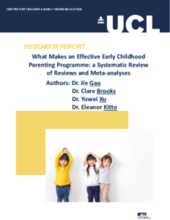ABSTRACT
The widely acknowledged importance of educating parents in children's early years has led to a substantial number of parenting programmes aimed at various aspects of early childhood care and education (ECEC). A vast amount of research has been conducted to evaluate the effectiveness of existing parenting programmes. By synthesising the research evidence, this study seeks to address the questions of whether early childhood parenting programmes are effective in improving parenting and enhancing children's development; and which factors of the programme design and implementation contribute to the successful outcomes of parenting programmes. A systematic search of bibliographic databases for reviews and metaanalyses of existing early childhood parenting programmes in the past ten years (2010-2020) was conducted through ProQuest, Ovid and EBSCOhost. Forty-seven review studies are eligible for inclusion. A thematic approach is adopted to synthesise the findings of reviews and meta-analyses. Overall, short-term positive effects on the various parent outcomes measured by the programmes have been reported with small to medium effect size across reviews. But the positive programme effects on parents do not guarantee improvement in children's development as mixed results are reported regarding the children's outcomes. Evidence of long-term effects has been far from conclusive due to the paucity of empirical research as well as the inconsistent results within the existing literature, suggesting more studies are needed to address this gap. Evidence of programme effectiveness is discussed with reference to theoretical frameworks, programme length/intensity, delivery modes, familycentred approach (incl., father-inclusiveness) and cultural adaptation. Based on the research evidence, a list of practical suggestions is proposed in order to improve the design, implementation and evaluation of early childhood parenting programmes.

